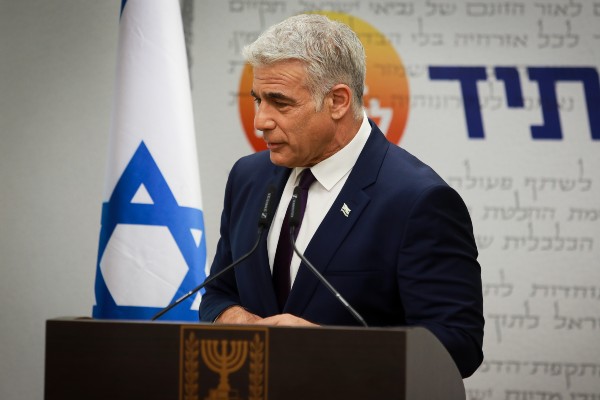Reopening consulate would “send the wrong message” and “destabilize” government.
By Pesach Benson, United With Israel
In a briefing with reporters on Wednesday, Foreign Affairs Minister Yair Lapid called reopening the U.S. consulate in Jerusalem “a bad idea” that Israel would oppose.
“We think it’s a bad idea,” Lapid said. “Jerusalem is the sovereign capital of Israel and Israel alone, and therefore we don’t think it’s a good idea. We know that the (Biden) administration has a different way of looking at this, but since it is happening in Israel, we are sure they are listening to us very carefully.”
Lapid said reopening the consulate “will send the wrong message, not only to the region, not only to the Palestinians, but also to other countries.” He also said such a move “might destabilize this government and I don’t think the American administration wants this to happen.”
The issue was similarly raised when Prime Minister Naftali Bennett held talks with President Joe Biden at the White House.
The U.S. consulate in Jerusalem was opened in 1844, and for years, it operated like any other consulate. But in 1993, Israel and the Palestinians signed the Oslo accords, and the consulate evolved into a de facto U.S. embassy for the Palestinians.
In 2017, President Donald Trump recognized Jerusalem as Israel’s capital, and in 2019, the U.S. embassy was moved there from Tel Aviv. The consulate was closed and its responsibilities were folded into the embassy as is standard practice at other embassies.
The Palestinians argue that the embassy relocation prejudices peace talks and that the majority of the world doesn’t recognize Jerusalem as Israel’s capital. But reopening the consulate would not only undermine Israeli sovereignty over the city, it would also violate Israeli, U.S. and international law.
Israel’s supporters argue that a more appropriate location for a consulate serving Palestinians would be Ramallah. The U.S. has maintained a cultural outreach center in Ramallah called America House Ramallah since 2014. The building is currently undergoing renovations.
When Israel’s War of Independence ended in 1948, the western half of the city was controlled by Israel while Jordan controlled the eastern half, including the Old City its holy sites. Israel reunited Jerusalem under its control during the 1967 Six-Day War.
In other remarks at the press conference, Lapid treaded carefully when asked about the U.S. withdrawal from Afghanistan.
“It was probably the right decision but wasn’t performed in the right manner,” Lapid said, adding, “We don’t understand completely all the consequences of this move, of this retreat.”
Questioned about the White House’s diplomatic efforts to return to the Iranian nuclear agreement, Lapid said, “Right now it seems like the agreement is not going anywhere and the talks are not going anywhere. The world needs a plan B, and Iran needs to know there is a credible threat on it if they will keep on advancing their nuclear program as they do now.”
MAKE THE LAND OF ISRAEL EVEN MORE BEAUTIFUL!
PLANT YOUR VERY OWN FRUIT TREES IN ISRAEL!
Farmers near the Gaza border lost family, friends and workers. Spring is here, and they desperately need help to replant the farms. Join us in blessing the People and Land of Israel.
“I will ordain My blessing for you…” (Leviticus 25:4)



